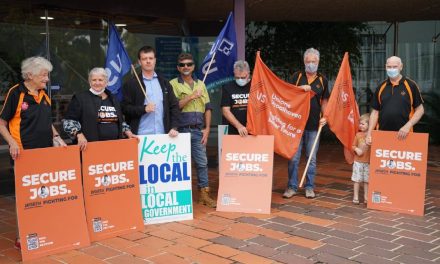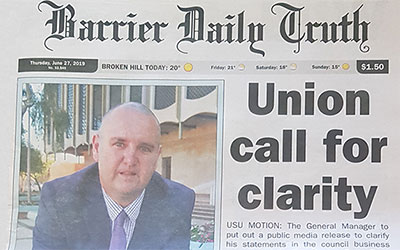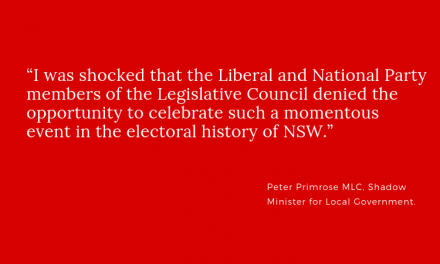EXCLUSIVE: news.com.au
City of Sydney parking inspectors say they are being “harassed, bullied and pressured” to meet steep “daily infringement quotas” set by the council.
If rangers fall below the “average” of 17 to 21 tickets in a shift by 25 per cent, they are subject to performance management and held back from yearly pay increases — even if their “beat” has no cars illegally parked.
Bizarrely, the council acknowledges this is its policy — but denies it constitutes a quota.
“(We’re) deflated, stressed, burnt out, copping it on all fronts, internal flak in addition to public flak,” said one ranger, who asked to remain anonymous.
The ranger said the “dark truth” about the council’s policy was that it was driving many rangers to breaking point and affecting their mental health.
They allege it’s a deliberate cost-cutting tactic by the council to avoid having to pay out the yearly progression payment — because it knows drivers have “learnt to comply over the years” since 2001 when parking enforcement duties were taken over from NSW Police.
Each of the 150 rangers is assigned a daily “beat”.
Some, such as those near construction sites or office buildings, are considered more productive with a higher number of offenders.

Picture: Evan Morgan Source: News Corp Australia
If rangers fail to issue at least 18 tickets in a shift they can be punished.
The ranger says the allocation of the good beats is subject to “preferential treatment” and that morale is being destroyed due to the “unfair handling of salary progression payments”.
In other councils, rangers’ performance is monitored by managers checking they are “chalking” their beat, checking for expired tickets or vehicles without tickets.
City of Sydney, however, bases performance “purely on the number of infringements issued”.
It can also punish rangers for “unexplained downtime” including “time lapses during shift” — which the council defines as the period between the issuing of one infringement to another.
“The team leaders do not come out to check on team members,” the ranger said. “The city can never provide evidence of a ranger not being in his beat or bludging during work hours.”
The United Services Union, which is representing the rangers, has written to the council asking it to “clarify” its policy.
“The Union is of the belief that the City’s response/position regarding the issue of Penalty Infringement Notices is contradictory in nature, stating on one hand that productivity and efficiency are measured inclusive of the number of cautions/PINs issued on average per shift over the 12-month period and then stating employees were communicated to clearly that there is no specific number in mind, nor specific target or average regarding the issuing of PINs,” USU general secretary Graeme Kelly said in the October 23 letter.

Rangers regularly cop abuse from members of the public. Source: News Limited
“The Union is of the opinion that despite the terminology used by the City being ‘expectations’, this in itself constitutes a defined number of PINs that are expected to be issued in a defined period of time. This constitutes a quota regardless of the wording.”
Mr Kelly said parking rangers had “overwhelmingly supported” this view, stating “18 PINs has been instructed to them as being the benchmark and failure to meet expected targets would lead to adverse action” including the “denial of salary progression”.
He added that the requirement to issue infringements regularly or be accused of a time lapse during their shift “has a direct correlation regarding the number of PINs that is expected to be issued”.
“The Union is of the opinion the provisions imposed by the City onto its parking rangers falls well short of the benchmark set by the City regarding its own values of Integrity, Quality and Respect, imposes potential Work, Health and Safety implications upon our members and falls well short of community expectations and ethics,” he said.
City of Sydney parking rangers have collectively signed a grievance notice submitted to the council and passed a motion stating that “we do not agree that expectations and downtime should be linked to performance assessments”.
A City of Sydney spokeswoman said the council “has responded to the union seeking clarification on the areas of concern raised in their letter” and that “we are committed to working with the union to ensure a fair resolution of these concerns”.

A parking ranger in the Sydney CBD in 2017. Picture: John Appleyard Source: News Corp Australia
“The City employs rangers to issue penalty notices for illegal parking,” she said. “It is important work, to ensure safe and equitable parking, with spaces turning over regularly, which is good for business and residents.”
The spokeswoman said City of Sydney rangers “are not assigned targets on parking infringement notices”.
“Rangers are not required to issue a certain number of PINs, nor are they required to monitor streets and parking more than is reasonable,” she said.
“The City regularly audits streets for illegal parking to better understand illegal parking behaviour. This information helped inform the current Parking Ranger Work Plan goals, which were established collaboratively with Parking Rangers in consultation with the United Services Union and establish the agreed performance level of staff.”
When rangers “consistently record fines at levels well-below that of their colleagues, or who have significant unexplained ‘downtime’, their performance may be assessed by their team leaders”.
“If there is no reasonable explanation, they are put on performance improvement plans,” she said.
“It is incumbent on the City to assess whether staff are working effectively, to ensure responsible and proper use of ratepayers’ money. There are many reasons a staff member may be put on performance management.”
She added, “The City’s performance improvement plans are designed to support an employee to meet the expectations of their role. Employees on PIPs receive ongoing support from the City, as well as assistance and coaching.”




